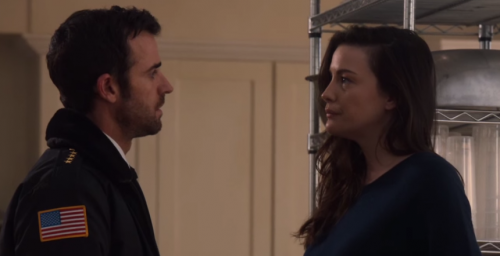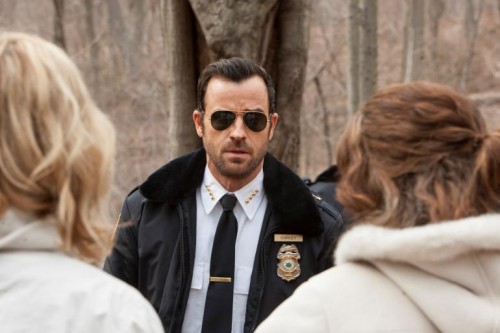
 Last scene: Gladys is surrounded by ATFEC body processors, which apparently treats cults as things to be exterminated, photographing bodies for minimal forensic analysis (they don’t want to solve the murders), and then putting them on an industrial conveyor belt for incineration. We get an overhead shot of Gladys on the belt, the camera tracking with her as she moves along, but too slowly: death and chaos, it seems to say, are outpacing even the camera’s ability to keep track of what’s going on.
Last scene: Gladys is surrounded by ATFEC body processors, which apparently treats cults as things to be exterminated, photographing bodies for minimal forensic analysis (they don’t want to solve the murders), and then putting them on an industrial conveyor belt for incineration. We get an overhead shot of Gladys on the belt, the camera tracking with her as she moves along, but too slowly: death and chaos, it seems to say, are outpacing even the camera’s ability to keep track of what’s going on.
It’s a fitting image for The Leftovers in more ways than one. Control is slipping away from Chief Garvey, from the townsfolk of Mapleton, even from the Guilty Remnant, and Lindelof’s just having so much fun writing weird, inexplicable stuff that the narrative may be spinning away from him (and us). Remember that trap door which took up all of Lost Season 2 but was almost fully insignificant by the end? The Leftovers‘s questions are fascinating, but the verdict on its quality (apart from its consistently great photography) awaits whatever’s coming next.
Take the baby factory scene opening episode 4: Everything is interchangeable and without distinction, until the good Mapletonians make a baby Jesus out of one of the dolls. Suddenly, you can’t just buy a new one; people’s feelings and the baby doll’s new context have rendered it unique. The incinerator scene inverts this, showing a particular human being lost again amid the industrial, depersonalized, clinical shuffle. The Reverend, along with the Chief, value Gladys’s body, her unique character. But in the end: ashes to ashes, dust to dust, matter to less complex, less interesting matter.
Despite the horror with which it’s filmed, the incinerator scene strangely complements the GR’s internal logic. Removing personal possessions, removing speech, and whitewashing apparel and personalities are their business. The idea seems something like standing as witnesses to the tragedy of the disappearance. They will not speak because no words can claim to address suffering. They’re trying to hit rock bottom in the same way as Palahniuk’s Fight Club guys – just hit rock bottom, witness to rock bottom, because everyone else out there is kidding themselves with delusions, justifications, and naïveté. The citizens of Mapleton cannot stand this witness against them, and the (increasingly Orwellian) Feds can’t abide the cults’ threats to order.
As told in Grace in Addiction, a wise AA old-timer once received a call from a millionaire threatening to jump out the window of his high-rise apartment. The old-timer entered his massive apartment – ankle-deep carpet and sculpted marble – and said, “If you sign all this over to me, I’ll push you”. It worked: he didn’t sign it away, and he didn’t jump. The idea was to help him hit rock-bottom through better means than jumping, and it worked.
In this counter-intuitive sense of ministry, the GR might be less enigmatic than supposed. When Gladys and one of her GR comrades pass an old guy fallen on the sidewalk without helping him up, it’s not mere selfishness or cruelty. No, they believe that something as mundane as picking oneself up from a fall doesn’t really matter, and the suffering may actually help him bottom out, may exercise his sense of futility until he realizes all his daily life is meaningless. (I wouldn’t be surprised if he turned up as a recruit later.) Thus the stoning is a test – the futility they agitate in others, can they bear it themselves? Gladys speaks: “Please stop. Please stop.” It’s one of the hardest-to-watch moments of television I’ve seen, and a failure in GR terms. She can’t quite believe her suffering is immaterial, whatever its lesson or message. It’s significant her nihilism is broken by her need.
Need, helplessness: these are lessons that “the 14th” should have taught everyone, the lesson, seemingly, that God’s acts of judgment are, even biblically, always supposed to teach people. Such divine events deconstruct us and leave us helpless. But those lessons we try to foist on others: think how many people around you need their self-images shattered, need their ego kicked down a notch – and then remember that’s the same extent people probably want to humble you. Many in this show is happy to pass that lesson onto others, through stonings or speaking truth or whatever else, but the GR is taking it upon themselves, too.
As is Lindelof: the show has been immensely imagistic so far: cheap shock value for the skeptics, but for the show’s believers, those images – futility and shock and brutality and sheer coping – are being impressed on our imaginations; the GR is witnessing to us. Yet the show will need to tighten up considerably in the next couple episodes to keep from losing the thread. Deconstruction here’s a dime a dozen, but Lindelof and co. need to start making something (who’s speaking to Garvey’s dad? What’s the deal with Wayne’s child? Dogs, weird deer, character development?) to keep interest.
The GR’s problem is their obsession with deconstruction, their essential nihilism. Nothing matters, and though it’s easier to live the unreflective life of a Mapletonian untroubled by GR visits, it’s also, as the Reverend says, easier to stay silent (i.e., to be a nihilist) than it is to speak out, to find new, constructive meaning.
As far as religious content goes, brilliantly painted fragments of religious feeling do not makes for a ‘deep’ show unless those fragments are well-configured. As a show about unraveling and judgment begetting judgment, Leftovers has been excellent. As a profound show about religion, it leaves something to be desired. Rev was alright up until a strange Gospel of Thomas line Sunday night:
And he took him, and withdrew, and spoke three sayings to him. When Thomas came back to his friends they asked him, “What did Jesus say to you?”
Thomas said to them, “If I tell you one of the sayings he spoke to me, you will pick up rocks and stone me, and fire will come from the rocks and devour you.”
“Not our dogs”, not our Jesus. The ‘believers’ – the Rev and the GR – are suffering persecution at the hands of an established order which does not want to be upset, and Rev’s quote seems to imply that those who attack the messengers will receive judgment. Yet the Gnostic element here – the special knowledge which cannot be spoken – is disturbing, and the viewer’s definitely left out of the picture, especially with regard to religion. The last recognizable religious character just dropped a GoT (not Thrones, sadly) quotation from memory, and though the emotions still line up, what’s the role of traditional religion here?
It all comes back to the Chief, at least for me: despite the interchangeability of the industrially-produced baby dolls, he won’t buy a substitute child. He resists Gladys’s body being processed by the men in masks, and he’s modeling grace under pressure. His own struggle to stay sane, maintain his family, and respond to whatever weird call he receives will make or break the truly religious element here – strength beyond naïve denial or nihilistic silence, beyond the Rev’s obsession with finding meaning in guilt versus innocence; as Eliot wrote, “strength beyond hope and despair”. Right now, to call the Chief such a figure would be an overstatement, despite Theroux’s formidable grasp of the character. But there are too many otherworldly groups and outlandish images; a tighter focus, and a more genuinely religious show, would point us toward the chief.
Extras:
-The scenes of the men by themselves – Chief and Rev – are high points of the show; they’re trying so hard to cope amidst crippling pressure. Sort of like Hemingway’s men, but (much) less emasculated. Hemingway may’ve been truer-to-life; when are these guys going to break? And despite Liv Tyler’s multiple interesting facial expressions, the women are still pretty one-dimensional, excepting the GR leader, who got some much-needed development Sunday.
-Hope Lindelof’s learned some things about, well, planning your story ahead since the Lost days; otherwise this’ll be a two-season run. Safe to say we’re all on our guard against an excess of questions over answers and general narrative unwieldiness.
-The GR’s repression is interesting, but not quite true-to-life. Where the Rev is good is in emphasizing particularity, individuality – his emotions are heightened, not deadened. Also, who’s Neil?
-Finally, does anyone have a clue what’s going on in this show?

COMMENTS
4 responses to “On TV: The Leftovers”
Leave a Reply















What about the GoT being a signal of an alternate universe? Jesus not as Trinitarian, but Gnostic, and the implications start with a modified rapture. As a Lost fan, maybe I’m just predisposed to that thought.
Great post on a very interesting show. Thanks Will. And I couldn’t agree with you more about the religious dimension–as much as I enjoyed the Rev episode for its storytelling, I found his religiosity to be nigh on unrecognizable, and more than a little reminiscent of the John Locke’s unshakeable ‘faith in faith’ from LOST. Thankfully, there’s clearly a lot more to the character than his convictions, which is where Lindelof (and Berg!) shine. The scene in episode 5 with him on the megaphone with the GR was a highpoint.
As for your fears about the narrative getting too diffuse, I’m less concerned – partly cause it’s HBO, and partly cause there’s a source text (and the author appears to be very involved in the show), but we shall see.
I’m enjoying it though. Favorite characters thus far are the dog guy, GR’s Patti, and the no-nonsense mayor. Hopefully we’ll see more angles of Garvey than simmering rage in episodes to come (a little more Coach Taylor, a little less Jack Shepherd). Only unbearable element thus far the teenager party stuff. So silly.
I’ve watched the first 3 episodes Will, and I have NO IDEA what’s going on in this show (mostly because it hasn’t pulled me in enough to make me care what’s going on). I think I’ll get more out of it if I just read your posts on it, than try to slog through it.
I think Reverend Matt’s meaning of the GoT passage is more important than him reciting from a gnostic text. He tells Kevin, “It means its easier to stay silent than to speak truth. Killing these people is pointless. They don’t care because they’re already dead. What I want is to bring them back to life.” To me, our God is the one who speaks. With a word all of the universe came into being. He spoke through the prophets and through his son, who John in his Gospel called the word that became flesh.
There is this juxtaposition on the show between speaking and silence. Matt knows that words have power, especially those ones that are of the truth. The reverend I think still believes, like Peter in John 6:68, where shall he go because Jesus has the words of eternal life. This is what makes the scene at the end where Matt speaks Psalm 121 to the GR so powerful. He speaks the truth in love in the manner of Ephesian 4:15-16.
Anyways, I am loving the show but also am anxious about where Lindelof is taking us. If he has a plan or just making it up as he goes along. Hopefully, Perrotta is able to help guide him in the right direction.